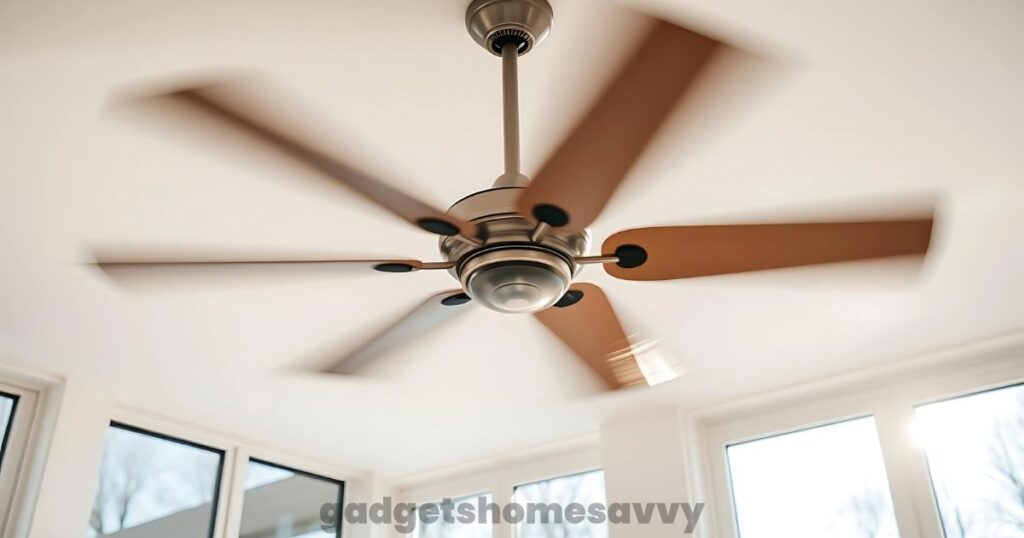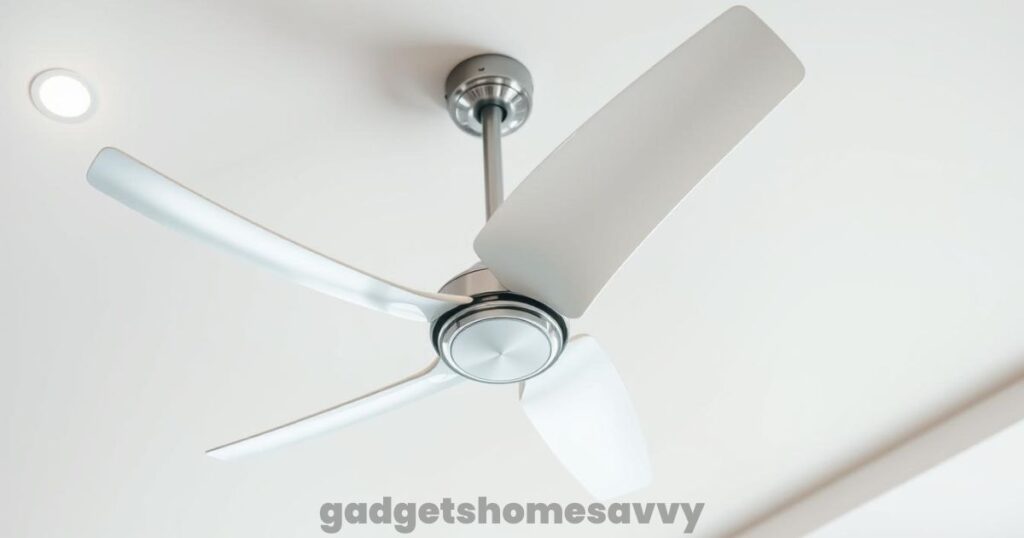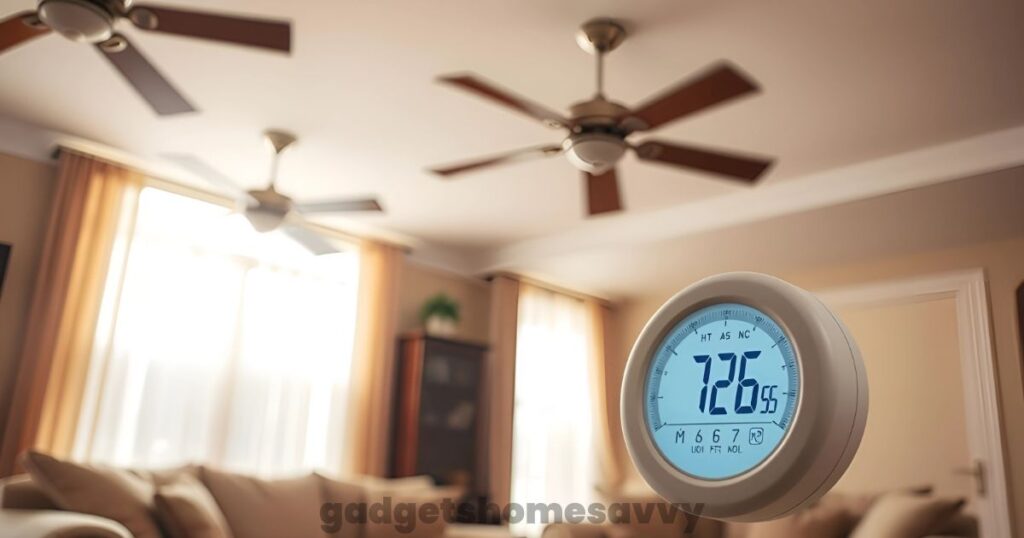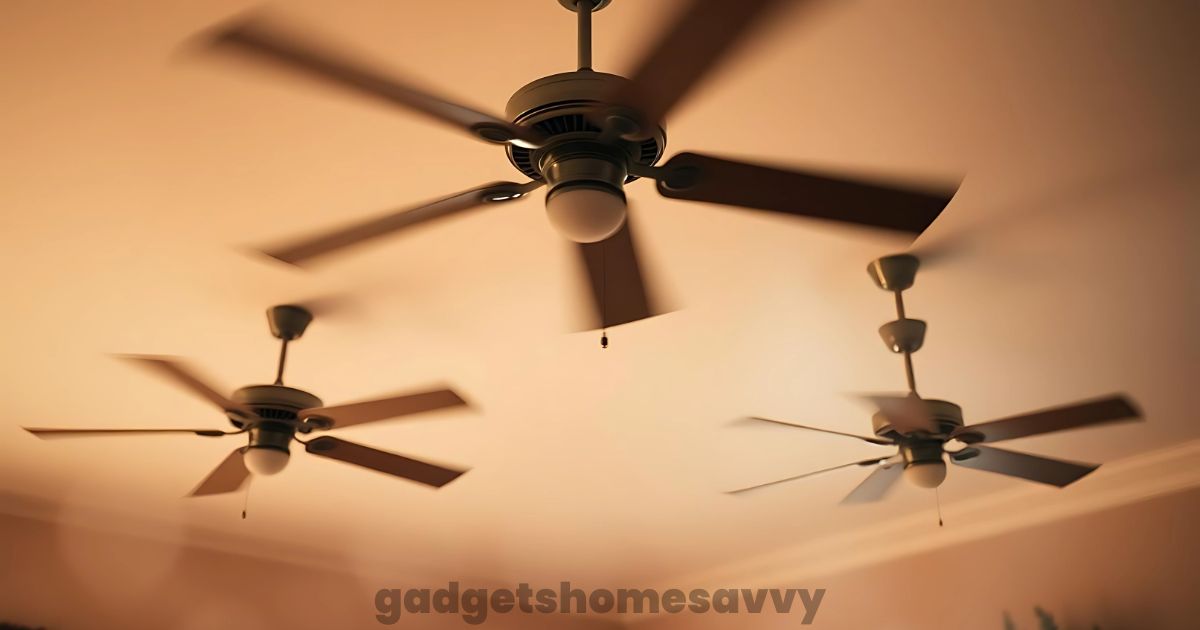Ceiling Fans Help with Humidity? Do you feel hot and sweaty in your home? Don’t worry, you are not alone who is facing this problem. No one likes too much air moisture, much less in the summer. The million-dollar question everyone wants to know the answer to is: Do Ceiling Fans Help with Humidity?
Ceiling fans important part of the house. They circulate the air in the room and provide a refreshing cool air. Do they, though, have anything to do with humidity? You may be surprised to find that they do. Understanding why ceiling fans play a part in your home’s comfort.
Key Takeaways
- Ceiling fans can produce air circulation by which reduces humidity.
- An efficient working ceiling fan can make your house comfortable.
- The effectiveness of ceiling fans in managing humidity depends on many factors.
- Correct use of ceiling fans is something one should learn.
- Ceiling fans are not an independent measure for humidity control.
How Ceiling Fans Help with Humidity and Indoor Comfort
It requires an understanding of indoor humidity for a home to be comfortable. You don’t know this, but humidity plays a significant role in your comfort and health.

Understanding the Role of Ceiling Fans Help with Humidity?
Humidity issues occur as a result of inadequate ventilation, external humidity, and domestic activity.
Some common causes include:
- Inadequate ventilation systems
- Outside high humidity
- Domestic showering and cooking routines
- Leaks or water damage within
These causes form the buildup of moisture. This is the ideal location for mold development, and it gets you sick and uncomfortable.
The Effect of Over-Humidity on Comfort and Health
Excess moisture makes your home warmer than it is. That is not pleasant. It also forms mold and dust mites that make breathing more difficult.
The medical issues are:
- Mold and dust mite respiratory problems
- Allergies
- Heat stroke and other heat-related illnesses are more likely
Experts say, “High humidity makes your home an allergen and germ breeding ground. That’s a health risk.“
“Prevention of mould growth and minimisation of the risk of respiratory disease is by the control of humidity.“
With this knowledge of indoor humidity, you are now able to start controlling it. This can render other ways of controlling humidity unnecessary, such as whether or not installing a ceiling fan will suffice.
Can Ceiling Fans Help with Humidity?
Ceiling fan use and humidity both center on cooling and air circulation. Ceiling fans don’t simply circulate the air. Ceiling fans control humidity by circulating air and cooling your space.
The Physiology of Air Movement and Humidity
The way ceiling fans combat humidity relies on air circulation. They spread treated air from your system throughout the room. This heats or chills your room, but not the temperature.
Air movement is the emphasis. It increases the evaporative cooling effect on your body. Air moving over your body accelerates the evaporation of sweat. It cools and relaxes you, even though it’s not cooler.

Evaporative Cooling on Your Skin
Evaporative cooling is effective when conditions are humid. Ceiling fans allow for sweat evaporation on your skin. This will keep you cool and even more comfortable. Ceiling Fans help with Humidity and also reduce it.
Ceiling Fans vs. Dehumidifiers: What’s the Difference?
It’s fascinating to find out the distinction between the feeling of being cooler and actual humidity. Ceiling fans cause you to feel cooler in moist air by cooling you. Ceiling Fans Help with Humidity. They don’t see the lower actual humidity of the air, however.
| Feature | Ceiling Fans | Dehumidifiers |
| Air Circulation | Yes | No |
| Actual Humidity Reduction | No | Yes |
| Evaporative Cooling Effect | Yes | No |
Gener, ceiling fans do not reduce humidity. They make you feel cooler when the exterior is humid, though. They increase cooling and air circulation. While not dehumidifying, ceiling fans help with humidity control by increasing the rate of evaporation from your body.
Best Ways to Use Ceiling Fans for Humidity Control
To control humidity, run your ceiling fan a bit slower. This will h it dry your home more effectively. The majority of homeowners are unaware of the fact that ceiling fans help with humidity if managed appropriately with ACs or dehumidifiers.
Seasonal Direction of the Fan
- Summer fan direction is crucial. It must be counterclockwise. That forces the cool air down and makes you colder.
- Rotate it slowly clockwise during winter. This forces the warm air down again, making your heater work better and controlling the moisture.
Optimal Fan Speed Ratings for Humidity Control
- Your fan speed matters as well. More speed during the summer keeps you cool. Do it, but don’t do too much, though – it’s too windy.
- For winter or cold weather, slow speed is best. It makes no drafts but also keeps warm.
- It doesn’t matter where you place your fan. It needs to be in a location where it can circulate the air freely throughout the room.
Optimal Position for Air Movement
In order to provide maximum air flow, the fans should be installed 7 feet from the floor and 8-10 inches from the ceiling. Having additional fans installed in large rooms guarantees air circulation throughout.
| Fan Placement Strategy | Benefit |
| Central location in the room | Maximizes air circulation |
| Multiple fans in large or open-plan areas | Ensures complete air circulation |
| Avoiding direct alignment with seating areas | Reduces drafts and improves comfort |

Reversing the fan direction, speed, and placement of your ceiling fan makes it more efficient at regulating humidity. This dehumidifies your home and makes it cozier.
Pairing Ceiling Fans with Other Humidity Solutions
Ceiling fanually capable of handling humidity when operated with other systems. They make your home comfortable and healthier. This is so when operated with other forms of humidity control. Ceiling fans help with humidity by making a current o,f air, which makes your space cooler and less humid.
Ceiling Fans and Air Conditioners: A Powerful Combo
It takes less power to blow air using ceiling fans during air conditioning. Ceiling fans move air, so you can set the AC setting higher without losing comfort. There is power conservation, and there is greater comfort and humidity control.
- Increase air flow, so your AC will work better
- Endorse a higher temperature setting, which will save energy
- Spread cooled air evenly throughout your home
- Operate Fans with Dehumidifiers for Maximum Impact
Pairing ceiling fans with dehumidifiers provides you with humidity control in your home. The dehumidifier extracts the moisture, and the fans circulate the dry air. It is ideal for humid climates or hot summer days.
The benefits of this blend are:
- Greater moisture extraction
- Improved air flow, achieving a balanced level of humidity in your home
- Potential decrease in dehumidifier use, leading to energy efficiency
Improve Ventilation Using Ceiling Fans in Humid Areas
- Ceiling fans also enhance natural ventilation in the home.
- They circulate the air within the room, minimizing the use of cooling and dehumidifiers.
- Ceiling fans help with humidity by supplementing natural ventilation systems.
- Ceiling fans help with humidity through the circulation of treated air, producing a healthier and more evenly balanced atmosphere.
To make this work best:
- Employ ceiling fans when you open windows to create a breeze of cooling
- Reverse the fan direction with the season changes to optimize airflow
- Install ceiling fans in bathrooms or kitchens where humidity is high to evaporate moisture rapidly

How Ceiling Fans Help with Humidity by Improving Thermal Comfort
While not dehumidifying the air, ceiling fans help with humidity by contributing to thermal comfort and heat perception reduction.
Why Ceiling Fans Help with Humidity When Combined with Ventilation Systems
The primary method that ceiling fans help with humidity is through evaporative cooling, which decreases the feeling of oppressiveness that high moisture creates.
Conclusion:
You can control indoor humidity via proper utilization of your ceiling fan. The operation of a fan circulates air and prevents moisture buildup.
Running your ceiling fan along with air conditioners or dehumidifiers gives your home an added advantage. It does not lower the humidity level. It cools your room and dehumidifies it, though. Running an AC fan is also helpful in circulating cooled air.
To improve your home, utilize your ceiling fan correctly. Learn how to direct it and adjust its speed. Position it where you can control humidity most effectively.
FAQ
Do fans help with humidity?
Fans, like ceiling fans, make you feel cooler in humid places. They move air and help cool you down. They don’t lower the humidity.
Do ceiling fans reduce humidity?
Ceiling fans do not lower humidity. They make air move, so you feel cooler. But the humidity stays the same.
Does running a fan lower humidity?
Running a fan doesn’t lower humidity. It makes air move better. This makes you feel cooler but does not change the air’s moisture.
Does running the AC fan reduce humidity?
Running the AC fan’s fan doesn’t lower humidity. But some ACs have a special mode. This mode can lower humidity.
Do ceiling fans harmonize with natural ventilation techniques?
Yes, you can also utilize ceiling fans in combination with natural means of air circulation. Like opening windows. This can potentially cool your area without the use of AC and dehumidifiers.
READ MORE BLOGS TO RESOLVE THE PROBLEMS THAT YOU FACED AT HOME.

